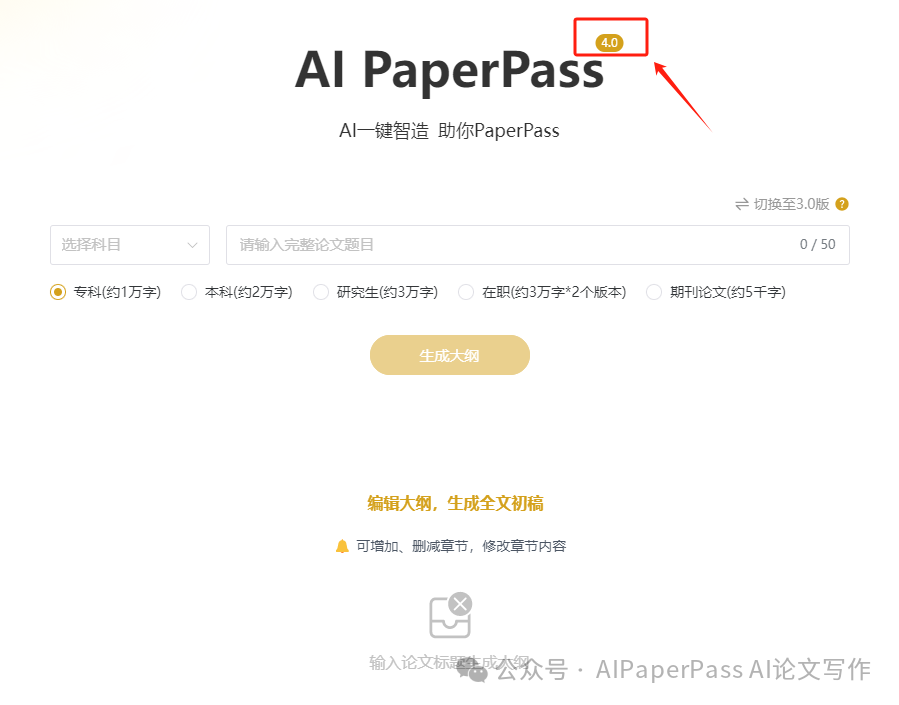点击下方▼▼▼▼链接直达AIPaperPass !
AIPaperPass - AI论文写作指导平台

这篇文章小编介绍了专门为论文写作定制的ChatGPT提示词,旨在激发创造力并为你的论文提供独特的想法和见解。通过简单的短语或指令,你可以解锁ChatGPT AI模型的潜力,生成将增强宝子们的论文写作体验的回应。
目录
主要内容简述:
1.通过提示词流程理解ChatGPT论文写作
2.四个关键的主要提示词
3.149+提示词干货
4.书籍介绍
AIPaperPass智能论文写作平台
主要内容简述:
1.论文写作挑战: 许多宝子们在开始论文写作时会遇到困难,比如不知道如何提出有说服力的论文陈述或如何启动写作过程。
2.ChatGPT提示的作用: 小编在这里提供一些能节省宝子们时间的解决方案,特别是对于那些在已经在使用AI领域工具进行工作学习的专业人士。通过使用预构建的提示词,可以节省时间和精力,专注于论文写作。
3.论文写作流程:这篇文章小编提供了一个详细的流程,从选择论文主题到写作简短内容,再到解释关键点和提供写作建议相关的内容。
4.使用Master Prompt: 网站提供了一个主提示词,用户可以根据需要在插入字段中添加值。这个提示覆盖了与论文相关的所有内容,但不是每在一个请求中全部附带。
5.论文写作提示列表: 小编在本文提供了150个左右的ChatGPT提示词,用于吸引人的论文写作。这些提示涵盖了从主题探索、研究问题制定、文献综述策略、论文陈述发展、方法论选择、理论框架、数据收集与分析、研究结果解释、研究意义、学术诚信、研究设计与抽样、数据呈现、调查和问卷设计、现有文献的批判性分析、引用来源和参考、研究目标的对齐、论文结构和组织、利用技术进行研究、客观性与主观性的平衡、反馈和修订、论文写作的时间管理、合作研究、跨学科视角、研究中的伦理困境、写作风格和清晰度、准备口头答辩、出版和传播、研究过程的反思、跨文化研究考虑、应对意外挑战、探索替代方法论、多学科方法、利用初级和次级数据、解决偏见、保持论证一致性、论文写作的数字工具、案例研究方法论、定量分析技术、理论基础构建、比较分析、克服写作障碍、社区参与、档案研究、视觉元素的整合、处理冲突发现、假设的角色、数字人文学科、个人反思、理论与实践的交叉、混合方法研究、数据收集的文化敏感性、纵向研究、同行评审的作用、知识产权问题、大数据分析、行动研究、理论辩论的整合、数字时代的论文写作、自我民族志、跨学科合作挑战、定性和定量方法的比较、增强论文的可访问性、公众参与、机构审查委员会(IRB)流程、元分析的作用、研究局限性的解决、与顾问有效合作的策略、现象学研究、性别与研究的交叉、叙事性查询等。
建议宝子们把收藏这篇文章,当需要查询上述主题的提示词时,就像启动秘密武器一样,按下Ctrl+F,轻松锁定你的目标指令。
1.通过提示词流程理解ChatGPT论文写作
1.充当论文写作专家。你将帮助我从选择论文主题到简要写作。
Act as a Thesis Writing Expert. You will help me from selecting a topic for my thesis to writing briefly on it.
2.在[插入领域]领域有哪些潜在的研究主题?你能提出一些可能性吗?这个领域目前的研究趋势或主题是什么?我对[插入主题]有一个大致的想法。你能围绕这个主题头脑风暴一些具体的研究问题吗?我在想出关于[插入主题]的研究问题上遇到了麻烦。提出一些不同的观点或子主题?在你的第一次回应中,只建议一些带有子主题的主题。我将从这些建议的主题中选择一个。然后,你将根据我选择的主题撰写你的回应。
What are some potential topics in the field of [insert field]? Can you suggest some possibilities? What are some current research trends or topics in this area? I have a general idea about [insert topic]. Can you brainstorm some specific research questions related to this? I’m having trouble coming up with a research question on [insert topic]. Suggest different perspectives or subtopics within this? Only suggest some topics with subtopics in your first response. I will choose one of those suggested topics. Then, you will write your response according to my selected topic.
3.一旦我确定了主题,就继续解释与我的主题相关的论文写作的关键点。例如,告诉我在写论文的过程中从开始到结束需要考虑的所有必要事项的清单。
Once I finalize the topic, move ahead and explain the key points for writing the thesis related to my topic. For example, tell me a list of all the necessary things which I need to consider from starting to end while writing my thesis.
4.在你提供了清单之后,我会确认它。
After you provide me with the list, I will Ok it.
5.现在,在你的下一个回应中,简要解释什么是影响我选择的主题的关键因素,以及它们如何影响[相关领域]?
Now, in your next response, Explain briefly What are the key factors influencing my selected topic and how do they impact [relevant field]?
6.然后,在你的下一个回应中,解释这个主题的历史意义及其影响。同时,讨论与[问题]相关的伦理考虑,并提出潜在的解决方案。
Then, in your next response, Explain the historical significance of this topic and its implications. Also, Discuss the ethical considerations associated with [issue] and propose potential solutions.
7.之后,在你的下一个回应中,分享如何进行全面的文献综述以及如何在文献中识别相互冲突的观点或辩论的策略。
After that, in the next response, Share Strategies for conducting a comprehensive literature review and how to identify conflicting views or debates in the literature.
8.之后,在你的下一个回应中,向我解释如何通过将问题陈述整合到与我的主题相关的内容中,使我的论文陈述更加有力。
After that, in the next response, Explain to me How I can make my thesis statement stronger by integrating a problem statement into this related to my topic.
9.然后,在你的下一个回应中,告诉我研究我的主题最合适的方法论是什么?
Then, in the next response, tell me What is the most suitable methodology for studying my topic?
10.之后,向我解释我如何从理论框架的角度来处理这个主题。还与我分享,在我的主题的文献中是否有任何相互冲突的观点或辩论?
After that, explain to me How I can approach this topic from a theoretical framework perspective. Also share with me, Are there any conflicting views or debates in the literature on my topic]?
11.然后,在你的下一个回应中,讨论我如何有效地解释我的研究结果的含义?
Then, in the next response, Discuss how I can explain the implications of my results effectively?
12.现在,在你的下一个回应中,协助我如何解释数据发现?
Now, in the next response, assist me how to interpret data findings?
13.我需要总结这些研究论文的主要发现。如何综合它们?
I need to summarize the main findings of these research papers. How to synthesize them?
14.你能帮我探索我的主题的潜在影响吗?
Can you help me explore the potential implications of my topic]?
15.我如何确保我的论文的学术诚信?
How can I ensure the academic integrity of my thesis?
16.我如何改善我论文中的学术写作风格?所以,你将向我解释所有与论文相关的问题。但你不会在一个回应中解释所有问题。一次只解决一个问题。一旦我对回应满意,你就可以继续下一个问题。
How can I improve the academic writing style in my thesis? So, you will explain to me all of these questions related to the thesis. But you will not explain all the questions in one response. Just tackle one question at a time. Once I am ok with the response then you can move towards the next question.
如何使用主提示:根据你的要求在插入空格中添加值。这个提示涵盖了与论文相关的所有内容。首先,它会建议主题/子主题/问题。你将从这些中选择并告诉ChatGPT你的选择。然后,它将详细阐述下一部分,你将给出反馈。一旦你满意,告诉ChatGPT“OK”,然后它将解释下一步,依此类推。
2.四个关键的主要提示词
4个强大且关键的ChatGPT提示词,用于论文写作
1.探索潜在的研究主题:
中文提示词:作为论文写作专家。你将帮助我选择一个论文主题并简要写作。
在[插入领域]领域有哪些潜在的研究主题?你能提出一些可能性吗?这个领域有哪些当前的研究趋势或主题?我对[插入主题]有一个大致的想法。你能围绕这个主题头脑风暴一些具体的研究问题吗?我在想出关于[插入主题]的研究问题上遇到了麻烦。提出一些不同的观点或子主题?在你的第一次回应中,只建议一些带有子主题的主题。
English Prompt:Act as a Thesis Writing Expert. You will help me select a topic for my thesis to write briefly on it.
What are some potential topics in the field of [insert field]? Can you suggest some possibilities? What are some current research trends or topics in this area? I have a general idea about [insert topic]. Can you brainstorm some specific research questions related to this? I’m having trouble coming up with a research question on [insert topic]. Suggest different perspectives or subtopics within this? Only suggest some topics with subtopics.
2.打造强有力的论文陈述:
中文提示词:我在想出关于[插入主题]的研究问题上遇到了麻烦。你能围绕这个主题头脑风暴一些具体的研究问题吗?提出一些不同的观点或子主题。向我解释如何通过整合问题陈述和与我的主题相关的问题,使我的论文陈述更加有力。
English Prompt:I’m having trouble coming up with a research question on [insert topic]. Can you brainstorm some specific research questions related to this? Suggest different perspectives or subtopics within this. Explain to me How I can make my thesis statement stronger by integrating a problem statement and questions into this related to my topic.
3.关键因素和历史意义:
中文提示词:解释影响我的[插入主题]的关键因素以及它们如何影响[相关领域]。讨论这个主题的历史意义及其影响。
English Prompt:Explain the key factors influencing my [insert topic] and how they impact [relevant field]. Discuss the historical significance of this topic and its implications.
4.进行全面的文献综述:
中文提示词:我的研究主题是[插入主题],它与[插入领域]相关。分享如何对我的话题进行全面的文献综述的策略,以及如何在文献中识别相互冲突的观点或辩论。
English Prompt:My topic for research is [insert topic] and it is related to the [insert field]. Share strategies for conducting a comprehensive literature review on my topic and how to identify conflicting views or debates in the literature.
3.149+提示词干货
一、主题探索:
1.在选择[插入领域]的研究主题时应考虑哪些因素?
What factors should be considered when selecting a research topic in [insert field]?
2.[插入领域]中的新兴趋势如何激发创新的论文主题?
How can emerging trends in [insert field] inspire innovative thesis topics?
3.讨论为论文选择相关且及时的研究主题的重要性。
Discuss the importance of choosing a relevant and timely research topic for a thesis.
二、研究问题构建:
4.探索制定清晰、简洁研究问题的不同方法。
Explore different methods for formulating clear and concise research questions.
5.究者如何识别现有文献中的空白以构建研究问题?
How can a researcher identify gaps in existing literature to formulate research questions?
6.讨论拥有具体、可衡量、可实现的研究问题的重要性。
Discuss the significance of having specific, measurable, and achievable research questions.
三、文献综述策略:
7.在准备论文时进行文献综述的有效策略是什么?
What are effective strategies for conducting a literature review in preparation for a thesis?
8.如何在文献综述中组织和综合来自不同来源的信息?
How to organize and synthesize information from diverse sources in a literature review?
9.讨论文献综述在塑造论文研究方向中的作用。
Discuss the role of a literature review in shaping the research direction of a thesis.
四、论文陈述发展:
10.探索制定引人注目且集中的论文陈述的技术。
Explore techniques for crafting a compelling and focused thesis statement.
11.问题陈述如何被整合以加强论文陈述?
How can a problem statement be integrated to strengthen a thesis statement?
12.讨论使论文陈述与研究问题保持一致的重要性。Discuss the importance of aligning the thesis statement with the research questions.
五、方法论选择:
13.比较和对比适用于[插入领域]的不同研究方法论。
Compare and contrast different research methodologies applicable to [insert field].
14.如何确定特定论文主题的最适用研究方法论?
How to determine the most suitable research methodology for a specific thesis topic?
15.讨论在选择研究方法论时考虑伦理问题的重要性。
Discuss the significance of ethical considerations in selecting a research methodology.
六、理论框架:
16.探索理论框架在指导论文研究中的作用。
Explore the role of a theoretical framework in guiding thesis research.
17.讨论[插入领域]中常用的理论框架及其应用。
Discuss common theoretical frameworks used in [insert field] and their applications.
18.研究者如何在论文中整合并证明理论框架的合理性?
How can a researcher integrate and justify a theoretical framework in their thesis?
七、数据收集与分析:
19.讨论论文研究中有效数据收集和分析的策略。
Discuss strategies for effective data collection and analysis in thesis research.
20.如何解决数据收集中的潜在挑战并确保数据的可靠性?
How to address potential challenges in data collection and ensure data reliability?
21.探索技术在增强数据收集和分析过程中的作用。
Explore the role of technology in enhancing data collection and analysis processes.
八、研究结果解释:
22.研究者如何有效地解释和呈现他们的论文发现?
How can researchers effectively interpret and present their thesis findings?
23.讨论处理意外或不确定结果的策略。
Discuss strategies for dealing with unexpected or inconclusive results.
24.探索客观呈现与结果解释之间的平衡。
Explor the balance between objective presentation and interpretation of results.
九、研究的影响:
25.探索讨论论文研究更广泛影响的方法。
Explore methods for discussing the broader implications of thesis research.
26.如何将论文发现与现实世界的应用和意义联系起来?
How to connect thesis findings with real-world applications and significance?
27.讨论考虑潜在社会或行业影响的重要性。Discuss the importance of considering potential societal or industry impacts.
十、学术诚信:
28.研究者如何确保在整个论文写作过程中保持学术诚信?
How can a researcher ensure academic integrity throughout the thesis writing process?
29.讨论避免论文中抄袭的常见陷阱和最佳实践。
Discuss common pitfalls and best practices for avoiding plagiarism in a thesis.
30.探索研究者在呈现研究结果时的伦理责任。
Explore the ethical responsibilities of a researcher in presenting research findings.
十一、研究设计与抽样:
31.讨论论文研究中设计良好的研究研究的重要性。
Discuss the importance of a well-designed research study in thesis research.
32.研究者如何解决与抽样和普遍性相关的问题?
How can a researcher address issues related to sampling and generalizability?
十二、数据呈现:
33.探索在论文中有效呈现数据的方法。
Explore effective ways to visually present data in a thesis.
34.讨论表格、图表和图形在增强数据呈现中的作用。
Discuss the role of tables, charts, and graphs in enhancing data representation.
十三、调查和问卷设计:
35.在为论文研究设计调查时应该考虑哪些因素?
What considerations should be taken into account when designing surveys for thesis research?
36.讨论问卷设计中的常见挑战以及克服它们的策略。
Discuss common challenges in questionnaire design and strategies for overcoming them.
十四、现有文献的批判性分析:
37.研究者如何在论文中批判性地评估和分析现有文献?
How can a researcher critically evaluate and analyze existing literature in a thesis?
38.讨论识别文献中的偏见和局限性的重要性。
Discuss the importance of identifying biases and limitations in literature.
十五、引用来源和参考:
39.探索论文中适当的引用风格和引用技术。
Explore proper citation styles and techniques for referencing in a thesis.
40.讨论在引用来源和保持一致性时需要避免的常见错误。
Discuss common errors to avoid in citing sources and maintaining consistency.
十六、研究目标的对齐:
41.研究者如何确保研究目标与整体论文目标一致?
How can a researcher ensure that research objectives align with the overall thesis goal?
42.讨论在整个研究过程中完善研究目标的策略。
Discuss strategies for refining research objectives throughout the research process.
十七、论文结构和组织:
43.探索有效地结构化和组织论文不同部分的方法。
Explore effective ways to structure and organize different sections of a thesis.
44.讨论引言和结论部分在论文中的作用。
Discuss the role of introductory and concluding sections in a thesis.
十八、研究中利用技术:
45.技术如何提高论文研究的效率和准确性?
How can technology enhance the efficiency and accuracy of thesis research?
46.探索数据分析、文献综述和论文写作中软件工具的作用。
Explore the role of software tools in data analysis, literature review, and thesis writing.
十九、客观性与主观性的平衡:
47.讨论论文定性研究中保持客观性的挑战。
Discuss the challenges of maintaining objectivity in qualitative research for a thesis.
48.探索研究者视角在塑造论文叙述中的作用。
Explore the role of the researcher’s perspective in shaping the thesis narrative.
二十、反馈与修订:
49.研究者如何有效地吸收来自导师和同行的反馈?
How can a researcher effectively incorporate feedback from advisors and peers?
50.讨论根据建设性反馈修订和改进论文的策略。
Discuss strategies for revising and improving a thesis based on constructive feedback.
二一、论文写作中的时间管理:
51.探索论文写作各个阶段的有效时间管理策略。
Explore effective time management strategies for the various stages of thesis writing.
52.讨论设定现实的时间线和里程碑的重要性。
Discuss the importance of setting realistic timelines and milestones.
二二、合作研究:
53.合作研究如何有助于提高论文的质量和深度?
How can collaborative research contribute to the quality and depth of a thesis?
54.探索与其他研究者合作进行论文项目的挑战和好处。
Explore the challenges and benefits of working with other researchers on a thesis project.
二三、融入跨学科视角:
55.讨论在论文中融入跨学科视角的优势。
Discuss the advantages of incorporating interdisciplinary perspectives in a thesis.
56.探索整合不同领域见解的挑战和策略。
Explore challenges and strategies for integrating insights from different fields.
二四、研究中的伦理困境:
57.探索[插入领域]研究者面临的常见伦理困境。
Explore common ethical dilemmas faced by researchers in [insert field].
58.讨论应对伦理挑战和保持研究完整性的策略。
Discuss strategies for addressing ethical challenges and maintaining research integrity.
二五、写作风格与清晰度:
59.研究者如何提高论文写作的清晰度和可读性?
How can a researcher improve the clarity and readability of their thesis writing?
60.讨论以简明方式传达复杂思想的策略。
Discuss strategies for conveying complex ideas in a straightforward manner.
二六、准备口头答辩:
61.探索有效准备和应对论文口头答辩的方法。
Explore effective ways to prepare for and navigate the oral defense of a thesis.
62.讨论在论文答辩中提出的常见问题和关注点。
Discuss common questions and concerns raised during thesis defenses.
二七、出版与传播:
63.准备论文出版涉及哪些步骤?
What are the steps involved in preparing a thesis for publication?
64.讨论通过会议和期刊传播论文发现的策略。
Discuss strategies for disseminating thesis findings through conferences and journals.
二八、反思研究过程:
65研究者如何在论文过程中反思他们的经验和所学到的教训?
How can a researcher reflect on their experiences and lessons learned during the thesis process?
66.探索自我反思在改进未来研究工作中的价值。
Explore the value of self-reflection in improving future research endeavors.
二九、跨文化研究考虑:
67.讨论为论文进行跨文化研究的挑战和好处。
Discuss the challenges and benefits of conducting cross-cultural research for a thesis.
68.探索解决文化偏见和确保文化敏感性的策略。
Explore strategies for addressing cultural biases and ensuring cultural sensitivity.
三十、应对意外挑战:
69.研究者如何有效应对论文过程中可能出现的意外挑战?
How can a researcher effectively navigate unexpected challenges that may arise during the thesis process?
70.讨论针对未知障碍调整研究计划的策略。
Discuss strategies for adapting research plans in response to unforeseen obstacles.
三一、探索替代方法论:
71.讨论在[插入领域]中使用替代研究方法的优势和挑战。
Discuss the advantages and challenges of using alternative research methodologies in [insert field].
72.研究者如何在论文中证明非传统方法的选择?
How can a researcher justify the choice of a non-traditional methodology in their thesis?
三二、论文研究中的多学科方法:
73.探索在论文中融入多学科见解的好处。
Explore the benefits of incorporating insights from multiple disciplines in a thesis.
74.讨论在多学科论文中保持连贯性的挑战和策略。
Discuss challenges and strategies for maintaining cohesion in a multidisciplinary thesis.
三三、利用一手和二手数据:
75.研究者如何在论文中有效地结合一手和二手数据?
How can a researcher effectively combine primary and secondary data in their thesis?
76.讨论每种数据类型在贡献全面论文中的作用。
Discuss the role of each type of data in contributing to a comprehensive thesis.
三四、解决论文研究中的偏见:
77.探索识别和减轻研究中潜在偏见的策略。
Explore strategies for identifying and mitigating potential biases in research.
78.讨论与偏见相关的伦理考虑以及如何应对。
Discuss the ethical considerations associated with bias and how to address them.
三五、论证中的一致性维持:
79.研究者如何确保论文中论证和逻辑的一致性?
How can a researcher ensure consistency in argumentation and logic throughout a thesis?
80.讨论章节间清晰过渡的重要性。
Discuss the importance of clear transitions between sections and chapters.
三六、论文写作的数字工具:
81.探索数字工具在组织、写作和编辑论文中的作用。
Explore the role of digital tools in organizing, writing, and editing a thesis.
82.讨论在论文写作中使用参考管理软件的好处。
Discuss the benefits of using reference management software in thesis writing.
三七、案例研究方法论:
83.研究者如何有效地为论文设计和分析案例研究?
How can a researcher effectively design and analyze a case study for a thesis?
84.讨论案例研究方法在论文研究中的优势和局限性。
Discuss the strengths and limitations of the case study approach in thesis research.
三八、探索定量分析技术:
85.讨论适用于[插入领域]的常见定量分析技术。
Discuss common quantitative analysis techniques applicable to [insert field].
86.探索选择论文研究最适当统计方法的考虑因素。
Explore considerations for choosing the most suitable statistical methods for thesis research.
三九、建立理论基础:
87.研究者如何为论文建立强大的理论基础?
How can a researcher build a strong theoretical foundation for their thesis?
88.讨论将理论概念整合到论文不同部分的策略。
Discuss strategies for integrating theoretical concepts into different sections of the thesis.
四十、论文研究中的比较分析:
89.探索在论文中进行比较分析的过程。
Explore the process of conducting a comparative analysis in a thesis.
90.讨论在比较研究中识别相似性和差异的重要性。
Discuss the significance of identifying similarities and differences in comparative research.
四一、克服写作障碍:
91.探索在论文写作不同阶段克服写作障碍的策略。
Explore strategies for overcoming writer’s block during different stages of thesis writing.
92.讨论保持一致写作习惯的重要性。
Discuss the importance of maintaining a consistent writing routine.
四二、论文研究中的社区参与:
93.研究者如何与社区互动以增强论文的影响力?
How can a researcher engage with the community to enhance the impact of their thesis?
94.讨论在研究中涉及社区时的伦理考虑。
Discuss ethical considerations when involving the community in research.
四三、探索档案研究:
95.讨论档案研究对论文的贡献价值。
Discuss the value of archival research in contributing to a thesis.
96.探索获取和分析档案材料的挑战和策略。
Explore challenges and strategies for accessing and analyzing archival materials.
四四、融入视觉元素:
97.视觉元素如图片、图表和图形如何增强论文?
How can visual elements such as images, diagrams, and graphs enhance a thesis?
98.讨论有效融入不同部分的视觉元素的指导方针。
Discuss guidelines for effectively integrating visual elements into different sections.
四五、处理冲突发现:
99.探索处理论文研究中冲突发现的策略。
Explore strategies for addressing conflicting findings in thesis research.
100.讨论透明呈现冲突结果及其影响的重要性。
Discuss the importance of transparently presenting conflicting results and their implications.
四六、假设的角色:
101.假设如何加强论文的结构和焦点?
How can hypotheses strengthen the structure and focus of a thesis?
102.讨论制定和测试[插入领域]假设的考虑因素。
Discuss considerations for formulating and testing hypotheses in [insert field].
四七、论文研究中的数字人文学科:
103.讨论数字人文学科工具和方法在论文研究中的作用。
Discuss the role of digital humanities tools and methods in thesis research.
104.探索技术对塑造研究问题和方法论的潜在影响。
Explore the potential impact of technology on shaping research questions and methodologies.
四八、融入个人反思:
105.研究者如何在不损害客观性的情况下将个人反思融入论文?
How can a researcher incorporate personal reflections in a thesis without compromising objectivity?
106.讨论论文写作中个人见解与学术超然之间的平衡。
Discuss the balance between personal insights and scholarly detachment in thesis writing.
四九、理论与实践的交叉:
107.探索论文如何将理论概念与实际应用联系起来。
Explore how a thesis can bridge theoretical concepts with practical applications.
108.讨论将理论洞察转化为可行建议的挑战和策略。
Discuss challenges and strategies for translating theoretical insights into actionable recommendations.
五十、利用混合方法研究:
109.讨论在论文中采用混合方法研究的好处和挑战。
Discuss the benefits and challenges of employing mixed-methods research in a thesis.
110.探索如何结合定性和定量方法来丰富论文发现。
Explore how combining qualitative and quantitative approaches can enrich thesis findings.
五一、数据收集中的文化敏感性:
111.研究者如何在为论文收集数据时确保文化敏感性?
How can a researcher ensure cultural sensitivity when collecting data for a thesis in [insert field]?
112.讨论跨文化研究的潜在挑战和解决方案。
Discuss potential challenges and solutions for cross-cultural research.
五二、探索纵向研究:
113.讨论为论文进行纵向研究的好处和挑战。
Discuss the benefits and challenges of conducting longitudinal studies for a thesis.
114.探索在较长时间内维持参与者参与的考虑因素。
Explore considerations for maintaining participant engagement over an extended period.
五三、同行评审的作用:
115.同行评审过程如何有助于论文的完善?
How does the peer review process contribute to the refinement of a thesis?
116.讨论在写作过程中寻求和吸收同行反馈的策略。
Discuss strategies for seeking and incorporating peer feedback during the writing process.
五四、导航知识产权问题:
117.探索论文研究中与知识产权相关的考虑因素。
Explore considerations related to intellectual property in thesis research.
118.讨论尊重版权和知识产权的策略。
Discuss strategies for respecting copyright and intellectual property rights.
五五、利用大数据进行论文研究:
119.讨论在[插入领域]论文研究中使用大数据的潜在应用和挑战。
Discuss the potential applications and challenges of using big data in [insert field] thesis research.
120.探索与大数据分析相关的伦理考虑。
Explore ethical considerations associated with big data analysis.
五六、探索行动研究:
121.行动研究如何应用于解决[插入领域]论文的实际问题?
How can action research be applied to address practical issues in [insert field] for a thesis?
122.讨论行动研究的迭代性质及其对论文写作的影响。
Discuss the iterative nature of action research and its implications for thesis writing.
五七、融入理论辩论:
123.探索[插入领域]内的理论辩论及其与论文的相关性。
Explore theoretical debates within [insert field] and their relevance to your thesis.
124.讨论承认和参与理论辩论如何加强你的论点。
Discuss how acknowledging and engaging with theoretical debates can strengthen your argument.
五八、论文写作在数字时代:
125.数字时代如何影响论文研究的过程和呈现?
How has the digital age influenced the process and presentation of thesis research?
126.讨论在线平台和数字工具在论文传播中的作用。
Discuss the role of online platforms and digital tools in thesis dissemination.
五九、探索自传体研究:
127.讨论在论文中使用自传体研究的潜在好处和挑战。
Discuss the potential benefits and challenges of employing autoethnography in a thesis.
128.探索在自传体研究中保持严谨性和反思性的考虑因素。
Explore considerations for maintaining rigor and reflexivity in autoethnographic research.
六十、跨学科合作挑战:
129.论文研究中的跨学科合作可能出现哪些挑战?
What challenges may arise in interdisciplinary collaboration for thesis research?
130.讨论跨学科有效沟通和合作的策略。
Discuss strategies for effective communication and collaboration across disciplines.
六一、定性和定量方法的比较:
131.比较论文中定性和定量研究方法的优势和局限性。
Compare the strengths and limitations of qualitative and quantitative research approaches for a thesis.
132.探索根据研究目标选择最合适方法的考虑因素。
Explore considerations for choosing the most appropriate approach based on research goals
六二、增强论文的可访问性:
133.研究者如何确保他们的论文对不同受众具有可访问性?
How can a researcher ensure that their thesis is accessible to a diverse audience?
134.讨论以易于广泛读者理解的方式呈现复杂思想的策略。
Discuss strategies for presenting complex ideas in a way that is understandable to a broad readership.
六三、融入公共参与:
135.探索将公众参与论文研究和传播发现的方法。
Explore ways to engage the public in thesis research and disseminate findings.
136.讨论在研究中涉及公众时的伦理考虑。
Discuss ethical considerations when involving the public in research.
六四、导航机构审查委员会(IRB)流程
137.机构审查委员会(IRB)在论文研究中的作用是什么,研究者如何导航审批流程?
What is the role of the Institutional Review Board (IRB) in thesis research, and how can researchers navigate the approval process?
138.讨论IRB流程中常见的伦理考虑和陷阱。
Discuss common ethical considerations and pitfalls in the IRB process.
六五、元分析的作用:
139.讨论为论文进行元分析的优势和挑战。
Discuss the advantages and challenges of conducting a meta-analysis for a thesis.
140.探索跨多项研究综合和解释发现的考虑因素。
Explore considerations for synthesizing and interpreting findings across multiple studies.
六六、解决研究限制:
141.研究者如何在论文中透明地解决和减轻限制?
How can a researcher transparently address and mitigate limitations in their thesis?
142.讨论承认限制及其对结果影响的重要性。
Discuss the importance of acknowledging constraints and their impact on results.
六七、与导师有效合作的策略:
143.探索与论文导师建立富有成效和支持性关系的策略。
Explore strategies for building a productive and supportive relationship with thesis advisors.
144.讨论研究者与导师之间有效沟通和反馈机制。
Discuss effective communication and feedback mechanisms between researchers and advisors.
六八、探索现象学研究:
145.讨论现象学在论文研究中的应用。
Discuss the application of phenomenology in thesis research.
146.探索在论文中捕捉和解释生活经验的考虑因素。
Explore considerations for capturing and interpreting lived experiences in a thesis.
六九、性别与研究的交叉:
147.研究者如何在论文研究中确保性别敏感性?
How can a researcher ensure gender sensitivity in thesis research?
148.讨论性别偏见对研究设计和解释的影响。
Discuss the impact of gender biases on research design and interpretation.
七十、论文写作中的叙事性查询:
149.讨论叙事性查询在论文中的原则和应用。
Discuss the principles and applications of narrative inquiry in a thesis.
150.探索在叙事研究中维持伦理标准的策略。
Explore strategies for maintaining ethical standards in narrative research.
有了定制的提示,复杂的任务变得简单,无误的写作变得可实现。那么,为什么要等呢?从今天开始使用ChatGPT提示,看着你的写作轻松地蓬勃发展。祝写作愉快!
4.书籍介绍
小编近期入手了中国人民大学刘东教授发布的《AI写作指南》,这本书非常棒,详细描述了AI工具在写作中的应用,合理全面并且指明了各类注意事项,给了小编非常多的启发。是一本非常值得入手的AI工具书。拥抱时代才是正确的选择,后续小编也会根据书中一些内容,整理成实战教程,详细给宝子们介绍一下论文写作过程中人大教授是如何合理指导大家使用AI工具的!
扫描二维码就可以下单哦:▼▼▼▼

覆盖学术写作全流程
一起成为超级作者!

作者|刘东
编辑排版| 朱安润 翟婧雅 王宇轩
责任审校| 关雪菁
谁能成为人工智能时代的超级作者?
一本书解决AIGC写作的底层逻辑
面对AI与论文写作,我们在头疼什么?
/// 写一篇论文要经过怎样的流程?
/// 从确定选题到发表,需要注意哪些问题?
/// 如何使用AI工具是符合学术伦理的?
/// AI工具给质性研究方法带来了哪些变革?
/// 如何运用AI工具做量化研究?
点亮未来AI时代论文写作的科技树
/// 顶尖“985”高校副教授教你,从选题到发表,全流程一站式搞定
/// 干货满满,实例拆解,配合详细的文字提示
/// 是给论文“小白”的“手把手指南”,也是给学术“大佬”的“实操性超强攻略”
/// AI时代的写作对人的创造性的要求只会更高,更需要我们了解如何以科技之力启发学术突破
![]()
![]()
正在上传…重新上传取消

“985”高校副教授、中国人民大学青年杰出学者
刘东
美国威斯康星大学-麦迪逊分校博士,中国人民大学新闻学院副教授,中国人民大学青年杰出学者。主攻量化研究方法,在心理学、新闻传播学、教育学、社会学等多个社会科学领域的国内外权威期刊上以第一作者身份发表SSCI论文20多篇,平均影响因子7分以上,谷歌学术被引次数超1000次。
AIPaperPass智能论文写作平台
AI PaperPass 4.0 Pro版本正式上线!我们的团队始终坚持技术创新是推动行业进步的重要动力。我们的团队秉承原创精神,致力于开发独特且创新的AI论文写作功能,以提供卓越的AIGC产品体验。AIPaperPass的技术成果不仅展示了我们的专业水准,而且确保了我们服务的查重率极低,保障每一位用户每一天都能体验到高质量的原创内容。

体验过AIPaperPass写论文真的很容易!
1. 一篇论文只需3步,「标题+专业方向-生成大纲-生成论文」
2. 文章内容质量优秀!10分钟即可得到3万字「大纲+论文+文献+开题报告!」
3. 查重效果显著!
4. 现在还可以上传资料进行「材料投喂」
5. Pro版本正式上线!「AI PaperPass Pro」
点击下方▼▼▼▼链接直达AIPaperPass !
AIPaperPass - AI论文写作指导平台






)


)

)


与容忍度(Tolerations))




实现淹没分析)